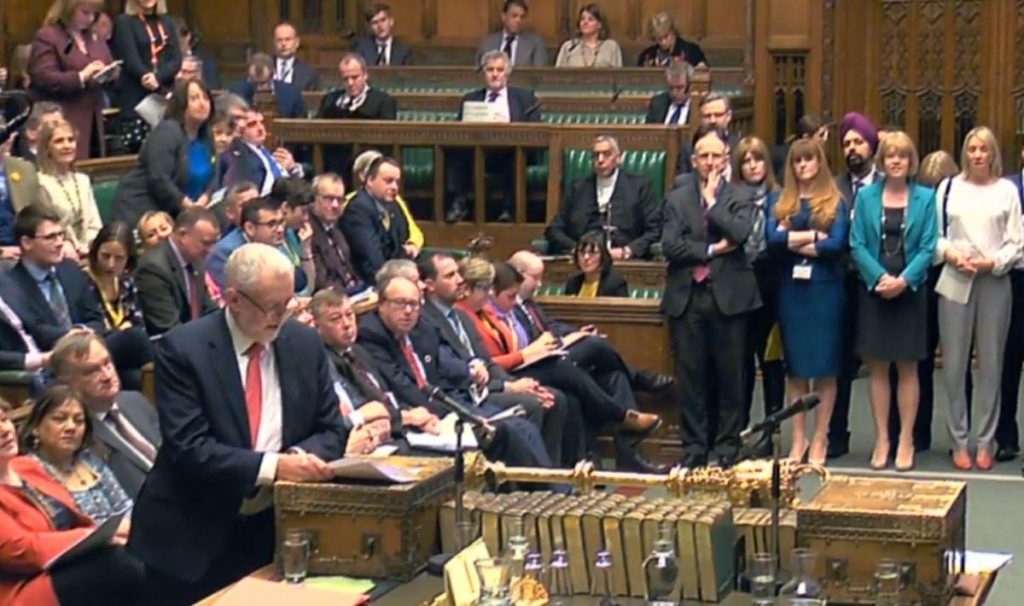The week wasn't really defined by the Russian nerve agent attack. It was defined by the British response. The spotlight we'd expect to shine outward turned inwards and, in a way that's become depressingly common, we didn't like what we found.
Strip it down to its bare bones and you've got a relatively simple situation here. The evidence overwhelmingly points to Russian state involvement. They have the motivation, they have the ability and they have the track record. No-one else does. But it is not proven yet and in all likelihood, because of the nature of the operation, never will be. So there is enough doubt for conspiracy theories to blossom and nervy politicians to be frozen by inaction.
In normal times, the obvious story would have defeated the imaginative ones. But we are not living in normal times. We are living through a substantial breakdown of trust in government and media. So instead of presenting a united front, British politics fell into recrimination and division.
Jeremy Corbyn made several errors in his response to Theresa May's statement on the Salisbury attacks – some of judgement, others of tone. But the key element was his eagerness to find an alternate explanation for the incident.


His statements were confused and contradictory, probably due to a growing sense of crisis as his back and front benchers rebelled against him. On Thursday afternoon he agreed "all the evidence points towards" Russia, but by Friday morning he had written an article in the Guardian claiming "a connection to Russian mafia-like groups that have been allowed to gain a toehold in Britain cannot be excluded".
He is right, it cannot be excluded. But there seems little reason to think it is the case. The nature of the nerve agent makes it highly unlikely.
Novichok, the 'N-series' of nerve agents, was secretly developed in Russia in the 1970s. Most of the information we know about it comes from Russian chemist Vil Mirzayayanov, who exposed the programme in 1991. It acts by flooding the gaps between nerve cells with acetylcholine.
It's really powerful stuff. A drop of VX, from the V-series, can kill a healthy adult. But the later N-series is much stronger than that, especially in the form of the most potent members – Novichok-5 and 7.
That's why they are binary agents, made from two safe precursor chemicals which are then mixed together just before use, probably at a pesticide or fertiliser manufacturing plant. This allows an agent to transport the chemicals safely and only create the lethal mixture when absolutely necessary.
Why on earth would a Russian mafia want to do this, rather than just shoot someone? What possible criminal group would have the means of achieving this? And why?
The involvement of the Russian state answers both those questions. They have the ability. In fact, they are the only people who know how to produce the agent.
They have the motivation, which is to send two messages. The first is to Russian double-agents that they can track them down. The second is to the international community, and Britain in particular, that they can act indiscriminately in the sovereign territory of other states, while still being considered respectable enough to host major international sporting tournaments like the World Cup.
They have also exhibited the pattern of behaviour to make this scenario credible, not least in the murder of Alexander Litvinenko using a radioactive isotope in 2006. As Nato secretary-general Jens Stoltenberg told the BBC:
"We have no reason to doubt the findings and the assessments made by the British government, not least because this takes place against a backdrop of a pattern of reckless behaviour by Russia over many years. The illegal annexation of Crimea, the continued destabilisation of eastern Ukraine, cyber-attacks and meddling in national elections, and many other activities. This is one element of many."
To compare this case with the security dossiers on Iraq, as Corbyn's spokesman Seamus Milne did, is absurd. This is a specific incident, in a small location, on British soil, which can be tested domestically by world-class analysts. It is not the same as the inane reports compiled by a desperate administration to create an excuse for war on the military capacity of a state they had not visited.
But in one sense Milne is right. At the heart of this is Iraq and the body-blow it dealt to the country's trust in itself. Iraq was the first domino. It broke trust in government. The financial crisis broke trust in the economy. The expenses scandal broke trust in MPs. Phone-hacking broke trust in the press. The Jimmy Savile outrage broke trust in the BBC.
One by one, the institutions crumbled.
Since the Brexit vote, many people claim that economic arguments are not considered important by the public. In fact, polling suggests they remain highly pertinent. What changed is that the public did not believe those making economic warnings. The trust was gone.
Something similar is happening here. Most will be willing to go with the account given by No.10 and the overwhelming majority of experts. But for many others, there is enough uncertainty to create a different narrative. One of 'false flag' incidents, which are so popular on the internet among the deranged and the terminally ironic. Or one where the government is accused of carrying out the operation to distract from its other errors. Or one where you can argue that – who knows? – maybe the mafia did it.
This is the age of distrust. It goes from the bottom of the internet sewer to the office of the leader of the opposition. It makes firm, concerted action and national solidarity almost impossible.
Ian Dunt is editor of Politics.co.uk and the author of Brexit: What The Hell Happens Now?
The opinions in politics.co.uk's Comment and Analysis section are those of the author and are no reflection of the views of the website or its owners.

